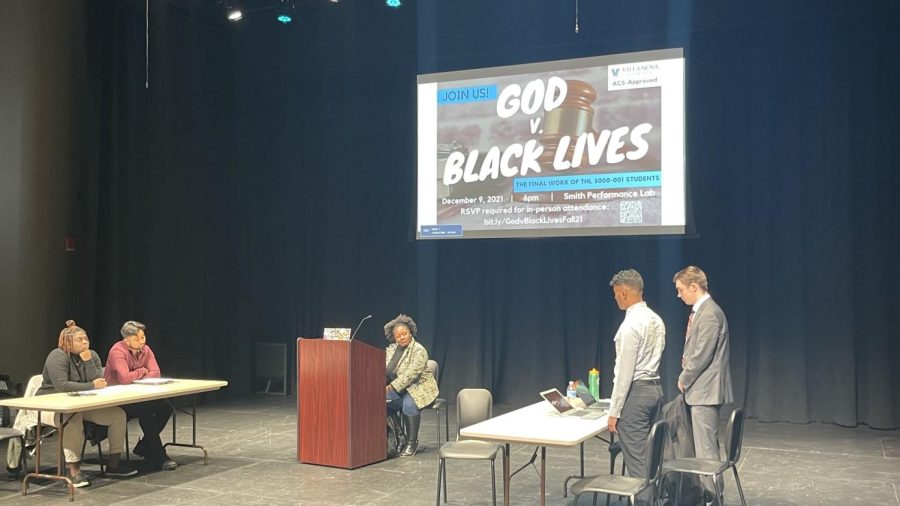God and Black Lives Matter: Mock Trial
Courtesy of Rev. Naomi Washington-Leapheart
Students put on a mock trial for their final theology project about God’s responsibility for black suffering.
December 15, 2021
This past Thursday in the Mullen Performing Arts Center, God Himself was put on trial.
As the final project for the upper level Theology class, “Do Black Lives Matter to God,” students partook in a mock trial in which they questioned God for the treatment of Black lives, touching on the greater question of why God seemingly lets people suffer.
The professor of the class, Rev. Naomi Washington-Leapheart, talked about the class’s premise.
“How is it that human suffering and evil can persist, even overwhelm humanity, if God is good, and God is powerful and God is presumably just?” Washington-Leapheart said about the main question on which the class was based.
To answer this question in reference to Black lives, Rev. Washington-Leapheart has conducted the same mock trial for her class at the end of each semester. She has taught the class since the Spring of 2016.
“I just wanted to figure out a way to first of all test students’ mastery of these theological concepts but also put it in a real world context where God is literally on trial,” Washington-Leapheart said.
Junior Eric Lavin, a member of the class, spoke about the way in which the trial is organized.
“In this trial, the prosecution is charging God for the reckless endangerment of Black lives and will try to prove this in court,” Lavin said. “The defense will attempt to show that God is innocent of the charge, while the jury makes the final decision.”
To prepare for the trial, Washington-Leapheart devotes four weeks at the end of the semester for students. Roles are chosen by an elimination process, assigning categories and giving students some choice on what role they want in the trial. After that, students then have to build their case. To help, Washington-Leapheart brings in attorneys and teaches the class about the trial process, jury instruction and law jargon so cases can be accurately built.
The mock trial took place in the Smith Lab in the Mullen Performing Arts Center on Thursday, Dec. 9. The event was open to any who RSVP’d.
Before the trial, Rev. Washington-Leapheart gave her take on the outcome of the present trial in relation to trials from previous classes.
“It’s been all over the place,” Washington-Leapheart said. “I function as the judge, so I’ll be listening and I’ll think the prosecution does a really good job, but the jury will find God not guilty. We have not had back to back semesters with the same verdict.”
As for this year’s trial, after both prosecution and defense, the jury voted that God was not guilty.
Lavin, who was a member on the jury this semester, spoke about his overall experience with the course.
“I have wanted to be a lawyer for a while and am currently thinking about law school, so I wanted a chance to be able to see both sides of the case and evaluate which team is making the most watertight argument,” Lavin said. “I think being a member of any jury can be a very insightful and unique experience, as although all of us have to serve jury-duty, most of us do not actually sit on a jury during a trial. This is perhaps one of the most important parts of our criminal justice system, and I think even being a member of a jury for a class trial can really offer a unique perspective, as both sides of the case are trying to appeal to you.”
Rev. Washington-Leapheart also spoke on her intentions for the class.
“My main goal as a Theology professor in general is to convince students that Theology matters,” Washington-Leapheart said. “Even if you’re not a reverend like me or you’re not active in a faith community, so much of our social norms, political ideas, have a theological root. So, I want students to recognize Theology when they see it out in the world.”
When asked about the inspiration for doing a mock trial as the final project, Rev. Washington-Leapheart noted two things.
In college, she took a class called “Suffering” for which she had to partake in a mock trial of God.
For her, the experience was “transformative,” and she wanted to recreate that for her own classroom.
The other inspiration for the mock trial was the book “The Trial of God” by Elie Wiesel, a Nobel Prize winner that explored a mock trial of God in relation to the Holocaust.
These inspirations not only prompted Rev. Washington-Leapheart to conduct her own version of this mock trial, but continues to prompt her hope that the experience will guide her students to grow as individuals.
“I also have as a goal for this particular course that students develop a greater sensitivity to human suffering,” she said. “There are things we say like ‘everything happens for a reason’ or ‘God won’t give you more than you can bear,’ and these things might be traditional things to say, but they don’t always land well on the person who is in pain and who is suffering.”
“I say to them all the time, ‘I want you to be able to support your friend, your loved one, who is going through a difficult situation by doing better theology around pain and suffering, so you can be a better friend.’”













